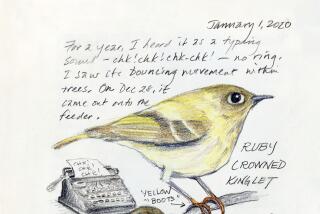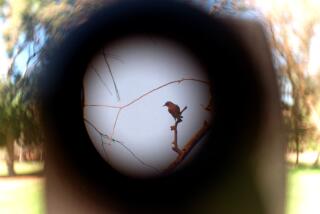In praise of the human in nature
- Share via
In one sense, this book appears under false pretenses, a kind of memoir-in-birding-book’s clothing. Aside from its initial chapter, there aren’t many birds in this book -- at least not as many as we might expect from a former executive director of the Maine Audubon Society. Those that do appear tend to do so tangentially, flitting in and out of paragraphs like swallows going to and fro in a barn, or else they are works of art, as in the chapter “Birding Through the Renaissance,” which is a lyrical tour of the aesthetic representation of birds in Italian frescoes, mosaics and murals during that era.
But one quickly forgives Thomas Urquhart any unintentional misrepresentation of the subject or focus of his book -- forgives it readily, not merely because the writing is so good, but also because his view of birds, and ultimately of nature itself, is so comprehensive and compelling. He regards birds, and their pursuit, not as some isolated natural phenomenon or self-sufficient “appreciation” of nature, but as an integral part of “the beauty of the earth,” a phrase that for Urquhart includes not only birds, forests, rivers, marshland, mountains and cultivated fields, but also history, art, music, literature, the sciences and, not least of all, the memory of his own childhood. For Urquhart the totality of being alive in a physical universe is what “nature” should mean; instead, Western culture too often uses it to mean something other than human.
Urquhart’s love for nature is “unabashedly humanistic,” and he is passionate above all about “landscapes with man.” In the central section, “Abroad,” he travels and meditates on places like the fountains and gardens of the Villa d’Este in Tivoli, the cultivated fields of southern France and the traditional villages of Mali -- all places where many generations of people have lived on and shaped the land in different ways, transforming it into something more than either mankind or nature could create on its own.
His highest praise is reserved for the unparalleled landscape of Provence, but he is no unquestioning Francophile; while he admires “the human joys of the meridional way of life,” he is uncomfortable with the accompanying attitude toward nature: “It is not the conviction that man is the center of the universe that troubles me, but that he can do what he likes since there is always time for confession.”
It is a very European, very English view of nature, and one we could use more of in the United States, where mainstream conservation has largely championed “unspoiled” wilderness as the most valuable of landscapes, and where most preservationists tend to assent to the dangerous dichotomy that divides the land into the categories of “protected” and “up for grabs.” Urquhart argues that it is our everyday lives and everyday surroundings, not our vacation destinations and official preserves, that should be the source of our greatest connection with nature. Moreover, he believes that simple, everyday human pleasures are a necessary complement to natural ones. “We could save all the wilderness left in the world,” he says, echoing one of Jesus’ questions to his disciples, “but if we are not allowed the time to drink a cup of coffee, what will it have gained us?”
“For the Beauty of the Earth” is a highly personal book, but it is also refreshingly free of the confessional mode and personal traumas that characterize much American nature writing and, for that matter, most memoirs. This book gives the lie to the widespread assumption that writers who had happy, loving and secure childhoods cannot write compelling memoirs.
The first section, “Home,” recounts Urquhart’s somewhat privileged background, the pleasures of the old family country house in the Essex Downs, and the deep and intertwining layers of human and natural history in the British landscape that made him “a history buff as well as a naturalist.” His background is one he neither flaunts nor apologizes for. All of our childhoods are givens; it is what we make of them that is important.
This memoir is so compelling because of the power of its thought and its writing. Urquhart’s style is deceptively reserved, quietly crafted, complex, flexible and dryly humorous. He has the English appreciation and capacity for the bon mot, noting, for example, that national priorities are reflected in the fact that in France one pays for gas “about what one pays for wine in America.” The vital link he perceives between nature and art provides him with such felicitous images throughout as “English sparrows brawl under a split-wood fence, in the manner of Breughelian peasants at a messe.”
He is equally adept at quoting Goethe in the original and using examples from American pop culture to illustrate the universal appeal of birds: “Even TV mob boss Tony Soprano is moved to tears by a family of ducks in his swimming pool.”
Urquhart writes throughout with a fine ear for the sound and rhythms of his sentences, as when he notes “the powerful musculature of a hare highlighted in the red rays of a setting sun as it races across the rosy fields.” Such constant pleasure is there in reading his prose, in fact, that I continually forgot I was reading this book to review it. Instead, I found myself thinking how much I would like to invite this man to dinner, so capable does he seem of talking knowledgeably, intelligently and engagingly about anything.
The last section, “For the Beauty of the Earth,” is Urquhart’s summing-up, a comprehensive survey and profound investigation of what he regards as the fundamental environmental dilemma of our time -- namely, the need to reestablish the “visceral appeal” of nature in our psyches if we are to survive as a species. In making his case, he challenges a number of sacred cows, such as the mantra of “sustainable development,” which he suggests is often at odds with our deeper need for an “emotionally nurturing landscape.”
With his love of languages, he accuses the environmental movement itself of having “done a poor job of building a vocabulary commensurate to the importance of the issue.” He believes deeply that “[k]eeping nature to be inspired by is every bit as critical to our species’ survival as is clean air and water” and warns that replacing the language of inspiration with that of socioeconomics to bring conservation into the mainstream risks “losing something ineffable that could be irreplaceable.” He bemoans the puritanical strictures that surround most environmental debate and mourns the loss of play, for “[i]mportant as it may be to promulgate rules to save species and build barriers to preserve places, the struggle will be won ‘in the heart of people.’ ”
For Urquhart, the bridge over the chasm between nature and our hearts lies primarily in art, and he finds the most promising and powerful templates for a new Earth-art in music, specifically in the operatic symphonies of Mahler or the “Ring” cycle of Wagner, which he interprets as a great myth of the reconciliation of humankind with nature. In comparison to such works, he has nothing but disdain for New Age music and “the feel-good confections that pass themselves off as a spiritual approach to nature.” He decries as “blasphemous” the notion that “one could simply take one ritual with a 2,000-year tradition and plunk it down on another willy-nilly,” and he finds “something unutterably sad about the predicament of a people who have lost their connection to the past and yet keep alive that sense of loss through increasingly meaningless rituals.” We may find raw material for a new Earth-art in pagan ritual, but Urquhart cautions that it will have to be more than borrowings: “It will have to develop its own ceremonies based on its own values.” This, he advises in characteristically English terms, will take discipline and a sense of duty.
It will also require a recognition of some rather unpleasant truths about ourselves. He demonstrates, for instance, the strange mix of cruelty and compassion in our attitudes toward nature with the example of Italian farmers who buried a live cockerel up to its neck and then, blindfolded, they whacked at it with sticks, “like a pinata.” Yet the same men, finding a swift marooned on the ground, “carefully bore it to the top of the bell tower of the church and reverently watched it fly away.”
Unlike most nature writers, Urquhart acknowledges a fundamental terror in nature, “a fear of oblivion” that is “rather like death.” In fact, he suggests that a psychic and physical removal might have been necessary in our evolutionary development as a way to protect us from “the raw forces of nature’s presence,” though that “mental shield against nature’s splendor is a luxury we can no longer afford.”
On the other hand, he passionately rejects as “dangerous heresy” and “despairing nihilism” the comforts of the long-view environmental philosophers, even while agreeing with them that, whatever we do, “Earth will continue on its axis unmoved, like the oak tree that silently engulfs the strand of barbed wire wound too tightly around it.”
Rather, like those who argue that God created man so that there would be someone to praise and appreciate his works, Urquhart argues that “we are unique in our ability to appreciate beauty and to elevate a sense of the aesthetic to divine heights.” He suggests, quoting Joseph Conrad, that “the unwearied self-forgetful attention to every phase of the living universe reflected in our consciousness may be our appointed task on this earth.... “
So lofty, subtly nuanced and complexly layered are his arguments that, when Urquhart finally offers a few specific suggestions for how we might go about recovering this visceral connection with the Earth, it is not surprising that they disappoint. Such apothegms as “I would give high marks to any word whose root had only one syllable” or his praise for a teacher on a nature walk with schoolchildren who uses a forthright Anglo-Saxon term -- “egg-farty” -- to describe the smell of a salt marsh sounds naive and unworthy of the level of thought that informs the rest of the book.
In the end, the dilemmas that Urquhart so eloquently lays out in “For the Beauty of the Earth” remain dilemmas. But it is the questioning itself that makes this book genuinely inspiring, questions asked so passionately, so intelligently and in such glorious and accomplished prose that Urquhart convinces us, against all cynicism, that our benighted species is capable of finding the necessary answers, and what’s more, he makes us eager to try. *
More to Read
Sign up for our Book Club newsletter
Get the latest news, events and more from the Los Angeles Times Book Club, and help us get L.A. reading and talking.
You may occasionally receive promotional content from the Los Angeles Times.









